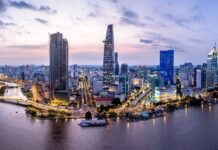Africa glowing is no myth, as rapid growth in what was once referred to as the ‘Dark Continent’ transforms the landscape of countries in the region. Africa’s GDP growth rate of six percent has surpassed that of Asia — making it the world’s fastest-growing continent and a promising target for global investors.
Figures show that the number of Africans living in cities has grown from 30 percent a generation ago to 40 percent today and it is predicted to rise to 50 percent by 2025. Yet despite this promising trajectory, the modern, urban, and thriving Africa is not the one that most people know of. The picture that jumps to mind when one thinks of Africa is either about, famine, HIV, coups and wars, or, it is of safaris, giraffes and lions on the vast Serengeti plains.
Swedish photographer Jens Assur is hoping to change all that with a new exhibition that forms a collection of photographs about the throbbing heart of modern, developing urban Africa. Focusing on big cities instead of the slums on the outskirts of urban areas, Assur has captured what could be called a revolution in terms of construction, infrastructure, growth, and development. Assur’s exhibit has attracted its share of controversy, mostly stemming from those who haven’t understood that its title, “Africa is a Great Country,” is intentionally ironic — meant to draw attention to the tendency many people have to lump Africa’s more than 50 countries into one category. Rather than staid images of a dying Africa, the images in the exhibition reflect a vibrant and living Africa. Assur hopes that the images will push people to see Africa as a thriving continent made up of a multiplicity of nations and cities teeming with people and growing at a frenetic pace. Below, we represent selection from Assur’s exhibition titled, ‘Africa is a Great Country’.
Investing in Africa
Africa is hot, but clearly not as sizzling as its equity markets that seem to be getting hotter by the day. In the last decade, six of the world’s top ten fastest growing economies were in Africa. With over 50 percent of Africa’s population aged below 20, and with its working-age population expected to exceed that of China within the next three decades, more than half of the continent’s households are predicted to have discretionary income by 2020. All of this is likely to give a further boost to investments in the African economy. Already investors worried at the consistent lack luster performance of markets in the developed world, are making a beeline to the African continent attracted by its steady GDP growth of over five percent during the past three years.
However, when it comes to investing in Africa, bunching the huge continent as a single homologous unit, neither reflects the uneven prospects of its varied regions nor the phenomenal potential of some of its individual nations. For instance, based on its differential patterns of growth and trade, the continent can be divided into three segments. The North African part with its well-developed trade, predominantly tied to the Mediterranean and southern Europe; the separate South Africa segment, easily the biggest economy in Africa, with its mature and more paced economic growth. And then there is the large Sub-Saharan region, made up of the remaining nations on the continent, which is being touted as next ‘new-frontier market’.
This is the area where much of Africa’s growth is forecast to happen in the coming decades. Even in this large grouping of nations there is no similarity in growth — markets of Nigeria and Kenya have displayed more than 50 percent growth in the past, while those in Central African Republic and other war ravaged countries have hardly shown a blip. One characteristic of all these ‘frontier-markets’ in the Sub-Saharan segment is their need for capital. This creates a lucrative opening for global investors seeking investment opportunities away from the underperforming markets in the developed world. Even small investors looking for a taste might choose to buy a stake in a mutual fund or one of the exchange-traded funds that mechanically track an index of frontiermarket stocks.
Of 200-odd shares listed on Nigeria’s stock market, the largest of the frontier markets in sub- Saharan Africa, about two dozen are liquid enough to make mutual-fund managers feel truly comfortable. Other attractive stocks that offer exposure to the African consumer include a handful of big consumer firms that have been in Nigeria for a long time, such as Unilever and Nestlé, a couple of local food suppliers and large beer companies.
Nigerian Breweries, which makes Star Lager and Legend Extra, and Nairobi based East African Breweries, have access to over 300 million beer-lovers in the region. However, beyond Nigeria and Kenya is a big liquidity cliff, with the next biggest exchange being in Zimbabwe, where even quite large stocks can be can be hard to buy and sell on a given day. One way around the shortage of liquid stocks is to buy companies that have most of their assets or earnings in Africa but are listed elsewhere. Some mining firms listed in London and Toronto have most of their assets in Africa.
The trouble with such stocks is that rather than betting on Africa’s growth story they tend to be a gamble on commodity prices and the skill of a team of geologists. That is why some mutual funds prefer stocks such as MTN, a South African cell-phone firm that makes a lot of its money in the rest of Africa. Shoprite, the largest grocery retailer in South Africa, is growing beyond its home base in South Africa and in a few years might similarly qualify for inclusion as a frontier investment.
A stark difference in African stocks from their mature counterparts in many developed countries is that in Africa the returns come from revenue growth and efficiency gains, not from financial engineering. One such private-equity success is Celtel, a singlecountry firm that transformed into a regional one when it was sold to Zain, a Kuwait based cellular outfit with presence in several African countries. In 2010, Zain sold its African operations to Indian cellular operator, Bharti Airtel.
Investors in Africa are buying the continent’s bigpicture growth story. As Africa’s stock markets deepen, and valuations rise, private-equity firms will increasingly look to public investors, currently starved of biggish stock to buy, to realize their investments. With stable politics, legalized frameworks and safeguards for investments, monetary accountability, independent central banks and the rule of law, the prospects for investing in Africa are brighter than ever before.

















